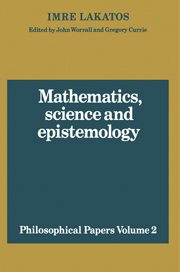Book contents
- Frontmatter
- Contents
- Editors' introduction
- PART 1 PHILOSOPHY OF MATHEMATICS
- 1 Infinite regress and foundations of mathematics
- 2 A renaissance of empiricism in the recent philosophy of mathematics?
- 3 Cauchy and the continuum: the significance of non-standard analysis for the history and philosophy of mathematics (edited by J. P. Cleave)
- 4 What does a mathematical proof prove?
- 5 The method of analysis-synthesis
- PART 2 CRITICAL PAPERS
- PART 3 SCIENCE AND EDUCATION
- References
- Lakatos bibliography
- Indexes
3 - Cauchy and the continuum: the significance of non-standard analysis for the history and philosophy of mathematics (edited by J. P. Cleave)
Published online by Cambridge University Press: 09 January 2010
- Frontmatter
- Contents
- Editors' introduction
- PART 1 PHILOSOPHY OF MATHEMATICS
- 1 Infinite regress and foundations of mathematics
- 2 A renaissance of empiricism in the recent philosophy of mathematics?
- 3 Cauchy and the continuum: the significance of non-standard analysis for the history and philosophy of mathematics (edited by J. P. Cleave)
- 4 What does a mathematical proof prove?
- 5 The method of analysis-synthesis
- PART 2 CRITICAL PAPERS
- PART 3 SCIENCE AND EDUCATION
- References
- Lakatos bibliography
- Indexes
Summary
Non-standard analysis is a fascinating topic for the historian and philosopher of mathematics. First, it revolutionizes the historian's picture of the history of the calculus. Also, it is one of the most interesting signs that meta-mathematics is turning away from its originally philosophical beginnings and is growing into an important branch of mathematics.
NON-STANDARD ANALYSIS SUGGESTS A RADICAL REASSESSMENT OF THE HISTORY OF THE INFINITESIMAL CALCULUS
The history of mathematics has been distorted by false philosophies even more than has the history of science. It is still regarded by many as an accumulation of eternal truths; false theories or theorems are banished to the dark limbo of prehistory or recorded as regrettable mistakes, of interest only to curiosity collectors. According to some historians of mathematics the ‘proper’ history of mathematics starts with those works which conform to the standards they regard as being ultimate. Others descend to the prehistoric ages only to pick out shining fragments of eternal truth from among the rubbish. Both miss some of the most exciting patterns of conjectures and refutations in the history of mathematical thought. Still worse, interesting inconsistent theories are distorted into ‘correct’ but uninteresting precursors of up-to-date theories. Efforts to save the authority of the giants of the past by giving them a polished modern look have gone further than one would imagine.
All this applies especially to the historiography of the infinitesimal calculus. Some of the most interesting features of the pre-Weierstrass era have gone unnoticed or remained un-understood (if not misunderstood) because of ‘rational reconstructions’. Robinson's work revolutionizes our picture of this most interesting and important period.
Information
- Type
- Chapter
- Information
- Mathematics, Science and Epistemology , pp. 43 - 60Publisher: Cambridge University PressPrint publication year: 1978
Accessibility standard: Unknown
Why this information is here
This section outlines the accessibility features of this content - including support for screen readers, full keyboard navigation and high-contrast display options. This may not be relevant for you.Accessibility Information
- 6
- Cited by
